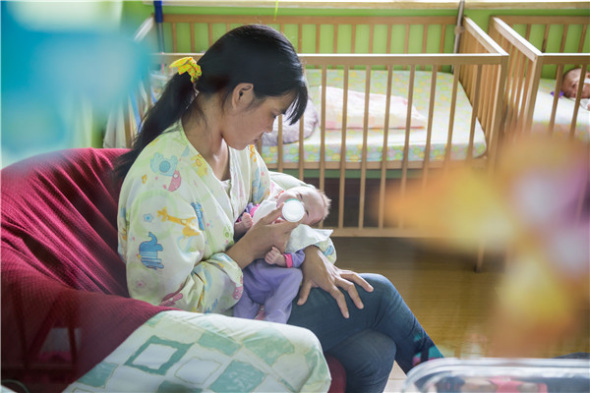
'Kangaroo mother' feeding a premature infant. (Photo: China Daily/Han Jiwei)
The Little Flower project aims to care for orphans
Chen Fang gets up at 5 am and rides her electric bicycle for 40 minutes to a villa in Beijing's northeastern suburbs.
The villa is home to premature infants and toddlers born with congenital conditions. They are sent there by welfare agencies.
Chen, 50, and 64 other "kangaroo mothers" are trained by the Little Flower orphan care project to offer the children "Kangaroo Mother Care" (KMC).
Founded in 1998, Little Flower aims to save and care for abandoned and physically fragile orphans.
KMC involves skin-to-skin contact between the baby's front and the "mother's" chest. This contact has improved the survival rate of premature babies. KMC has been widely used in the US, Japan and Europe, yet in China premature infants are often put in incubators from birth.
To mimic the atmosphere of the womb, "kangaroo mothers" must sit still for a whole hour without going to the bathroom or breathing heavily.
After nine and a half years, this is the longest time Chen has held one job. She previously worked in an embroidery workshop and carton factory. "Being with these babies is more than a job," she says, admitting the children will never recall these "mothers" when they grow up.
"We spend most of our time hugging babies. The more you hug them, the more they smile," Chen says. Left in their cots, they get restless.
Despite the happy moments, death is always lingering nearby. The fragile body is connected to an oxygen saturation monitor, and a stomach tube goes in a nostril as these babies are too premature to suck on a bottle. They may die of hunger if they are fed too little or suffer small intestine necrosis if fed too much.
It's a 24-7 job, but night shifts are the most energy-consuming. Some babies can die of respiratory arrest in their sleep, so staff must be alert to give emergency treatment or go to the hospital.


















































